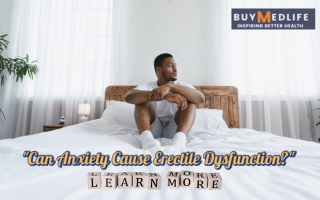Introduction
Erectile dysfunction (ED) is often thought of as a purely physical issue. While conditions like diabetes or heart disease are common culprits, mental health plays a crucial role in a man’s sexual performance—especially anxiety. Understanding the link between anxiety and erectile dysfunction is essential, not just for treatment but also for prevention.
In this blog, we’ll explore how anxiety can trigger or worsen ED, the cycle it creates, and how to break free from it using a combination of therapy, lifestyle changes, and, when necessary, medication.
What Is Erectile Dysfunction?
Erectile Dysfunction (ED) is the persistent inability to achieve or maintain an erection firm enough for sexual intercourse. It affects up to 30 million men in the United States alone, with varying degrees of severity.
Common causes include:
-
Cardiovascular disease
-
Diabetes
-
Obesity
-
High blood pressure
-
Low testosterone
-
Neurological conditions
-
Certain medications
-
Psychological factors like anxiety, stress, and depression
What Is Anxiety?
Anxiety is a mental health disorder characterized by feelings of worry, fear, or unease that are strong enough to interfere with daily life. While occasional anxiety is normal, chronic anxiety disorders affect over 264 million people globally, often impairing both mental and physical health.
Common types of anxiety include:
-
Generalized Anxiety Disorder (GAD)
-
Social Anxiety Disorder
-
Panic Disorder
-
Performance Anxiety
-
Health Anxiety (Hypochondria)
The Connection Between Anxiety and Erectile Dysfunction
1. Fight-or-Flight Response
When you’re anxious, your body activates its fight-or-flight response, releasing stress hormones like cortisol and adrenaline. These hormones redirect blood flow to essential organs (like the heart and lungs) and away from the genitals, making it difficult to get or maintain an erection.
2. Mental Distraction
Anxiety pulls your focus away from the present. When your mind is consumed by worries—“What if I can’t perform?”—it becomes difficult to stay aroused. Even the anticipation of failure can sabotage an erection.
3. Cycle of Self-Doubt
One failed attempt can lead to self-doubt, creating a vicious cycle:
Anxiety → Poor performance → More anxiety → Repeated ED
This feedback loop is often referred to as performance anxiety, and it’s one of the most common psychological causes of ED.
4. Negative Body Image
Men suffering from anxiety may also struggle with low self-esteem, which makes them more self-conscious during intimacy. If you don’t feel attractive or confident, your body reacts accordingly, often leading to erectile issues.
Signs Your ED Is Caused by Anxiety
Wondering if your ED is psychological rather than physical? Here are some signs:
-
You can get erections during masturbation or while sleeping but not during sex.
-
ED started suddenly, especially after a stressful event.
-
You’re younger and generally healthy.
-
Your ED is inconsistent—sometimes you can perform, sometimes not.
-
You feel nervous or afraid before intimacy.
-
You tend to overthink your performance.
Performance Anxiety: The Silent Saboteur
Performance anxiety is one of the most common forms of anxiety-related ED. It’s the fear of not being able to perform sexually. Men with performance anxiety often worry about:
-
Whether their erection will last
-
If their partner will be satisfied
-
How their body looks
-
Premature ejaculation
This leads to increased stress, making sexual arousal even harder.
The Physical Effects of Chronic Anxiety on Sexual Function
Over time, chronic anxiety can lead to physical changes that make ED worse:
-
Hormonal imbalance: Long-term stress increases cortisol and reduces testosterone, both of which impact libido and performance.
-
High blood pressure: Stress can elevate blood pressure, reducing blood flow to the penis.
-
Sleep disorders: Anxiety often disrupts sleep, which further reduces testosterone and libido.
-
Substance use: Many people turn to alcohol, cigarettes, or drugs to cope with anxiety—all of which negatively affect sexual performance.
How to Treat Anxiety-Induced Erectile Dysfunction
1. Cognitive Behavioral Therapy (CBT)
CBT is a proven psychological treatment that helps you identify and change negative thought patterns. For ED, it focuses on:
-
Managing performance fears
-
Reducing sexual anxiety
-
Boosting self-confidence
-
Learning relaxation techniques
Studies show that CBT can be as effective as medication, especially in younger men with anxiety-driven ED.
2. Sex Therapy
This is a form of talk therapy tailored to sexual issues. A certified sex therapist helps couples:
-
Improve communication
-
Reduce performance pressure
-
Create a more relaxed sexual environment
-
Set realistic expectations
3. Mindfulness and Meditation
Mindfulness teaches you to stay present, letting go of future-based worries like “What if I can’t perform?” Techniques include:
-
Deep breathing
-
Guided meditation
-
Progressive muscle relaxation
Studies show that even 8 weeks of mindfulness training can improve ED symptoms significantly.
4. Medication (If Needed)
If psychological techniques don’t fully resolve the issue, medications like Viagra (sildenafil) or Cialis (tadalafil) can help by improving blood flow. This removes some of the physical barriers and boosts confidence.
However, medication should be paired with therapy for long-term success, especially if anxiety is the root cause.
5. Healthy Lifestyle Changes
-
Exercise: Regular physical activity improves blood flow and releases mood-lifting endorphins.
-
Sleep: Aim for 7–9 hours of quality sleep.
-
Limit alcohol and avoid drugs: These substances can worsen both anxiety and ED.
-
Nutrition: Foods high in antioxidants and omega-3 fatty acids promote sexual and mental health.
Can Anxiety Medications Cause ED?
Ironically, some medications used to treat anxiety—especially SSRIs (Selective Serotonin Reuptake Inhibitors)—can cause or worsen ED.
If this happens, talk to your doctor. Alternatives include:
-
Adjusting the dosage
-
Switching to a different class of medication
-
Adding ED-specific medication (like Viagra)
-
Trying therapy-based treatments instead
Breaking the ED-Anxiety Cycle
Let’s look at how to break the cycle step by step:
| Problem | Reaction | New Action |
|---|---|---|
| Fear of failure | Avoid intimacy | Practice mindfulness |
| Poor performance | Shame and doubt | Talk to a therapist |
| Performance pressure | Overthinking | Focus on foreplay and connection |
| Temporary ED | Self-blame | Recognize it’s common and treatable |
Real-World Example: Jake’s Story
Jake, a 32-year-old marketing executive, experienced ED for the first time after a stressful breakup. He began to dread intimacy. Even with a new, supportive partner, he struggled to perform. Therapy helped him uncover underlying anxiety and rebuild his self-esteem. Now, with occasional use of medication and regular mindfulness, Jake reports a healthy and satisfying sex life.
When to Seek Help
If anxiety or ED is affecting your relationships or self-worth, it’s time to speak with a professional. A therapist, counselor, or urologist can guide you to the right combination of treatments.
Don’t wait—early intervention means better outcomes.
FAQs About Anxiety and Erectile Dysfunction
Can anxiety really cause erectile dysfunction?
Yes. Anxiety disrupts blood flow, hormone balance, and mental focus—key elements needed for an erection.
Will ED from anxiety go away on its own?
It can, especially if the anxiety is short-lived. However, chronic anxiety often requires therapy or treatment.
Can antidepressants cause ED?
Yes, especially SSRIs like fluoxetine or sertraline. Alternatives or add-on treatments may help.
Is it normal to have ED in your 20s or 30s?
Yes, especially if anxiety or stress is involved. Up to 26% of men under 40 experience ED at some point.
Should I use Viagra if my ED is from anxiety?
It may help in the short term, but addressing the root cause—anxiety—is key to lasting improvement.
Can couples therapy help with ED?
Absolutely. Sexual dysfunction often affects relationships, and couples therapy can restore intimacy and communication.
Final Thoughts
Anxiety and erectile dysfunction are deeply connected. One affects the other in a feedback loop that can be hard to escape. But the good news is that both are highly treatable—especially when addressed together.
With the right blend of therapy, lifestyle changes, and medical guidance, you can reclaim your confidence, enhance intimacy, and break free from the cycle of anxiety-induced ED.








